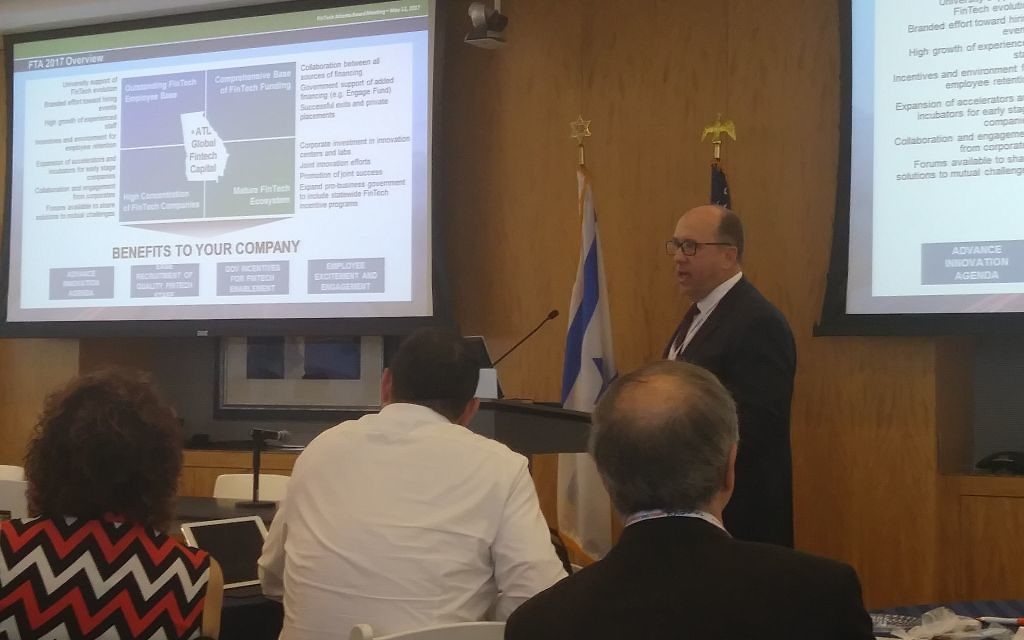Atlanta Tries to Build on FinTech Ecosystem
Atlanta processes three-quarters of U.S. financial transactions and serves as the home for more than half the nation’s FinTech companies.

Atlanta is a big market for financial technology, processing three-quarters of U.S. financial transactions and serving as the home for more than half the nation’s FinTech companies, in part because the city is working hard to create an environment that attracts startups and investors.
“The city is giving incentive to companies like First Data to help drive the ecosystem,” Barry McCarthy, the executive vice president of network and security solutions at First Data Corp., said in a keynote address Tuesday, May 23, the second day of the two-day Atlanta-Israel FinTech Innovation Conference hosted by Conexx and the Israeli Consulate General at Greenberg Traurig. “Because of the high concentration of FinTech companies, Atlanta is good place to start a company and relocate.”
Companies from all over the world, including Israel, come to Atlanta to do business, said Mitchell Kopelman, the partner in charge of Aprio’s tax practice and its technology and biosciences group. He said Georgia is reducing taxes for FinTech corporations.
Get The AJT Newsletter by email and never miss our top stories Free Sign Up
“Georgia has tax credits,” Kopelman said. “There is a tax credit for research and development and a refundable tax credit for locating in certain areas.”
You can sell the tax credits to a third party, enabling companies to get the money faster, Kopelman said.
Georgia also gives companies $3,500 per employee for five years if they create innovation centers.
The state has been rated No. 1 for business and for entrepreneurs, said Jorge Fernandez, the vice president of global commerce for the Metro Atlanta Chamber. Atlanta is an economic driver in the Southeast with an economy larger than Denmark.
The city has the nation’s third-largest concentration of Fortune 500 companies, and there are multiple examples of companies such as e-Solutions, a Brazilian-based FinTech company that left Silicon Valley for Atlanta, said Fernandez, who credits the success to low operational costs.
Business expenses that average $100 across the nation cost $105.70 in New York but only $95.10 in Atlanta, he said. “The cost of living is also lower. For every dollar you spend in the U.S., you spend $2.274 in New York and in Atlanta only $0.999, which is right at the national average.”
McCarthy said that when he traveled to London, financial officials recognized that Atlanta has emerged as a FinTech capital, but many companies are more focused on the long-term market for investors than the immediate ecosystem.
First Data, therefore, is partnering with colleges and universities to create a curriculum that will provide students with the skills companies require. He said the biggest challenge to retaining the talent coming out of colleges like Georgia Tech is that graduates don’t know what FinTech is.
“I talk to them, and they’ll say, ‘I’m not majoring in finance,’ ” McCarthy said. “They don’t understand FinTech is an element in everything. Their Apple payments use FinTech.”
First Data doesn’t necessarily scout for talent, but McCarthy said a team is looking for companies that have emerged and are gaining traction. First Data recently acquired Acculink, which helps merchants choose a debit network to route transactions saving time and money.
But Atlanta businesses can be a bit conservative when partnering with new companies, which can make it tough for companies in Israel and elsewhere to get new clients, said Orna Sharon, the director for business development at Conexx.
“For Israeli companies, they can be very successful outside of the United States, but when they come to the U.S., they have to start from scratch,” she said. “Some of the Israelis may have big clients in Israel and have been in operation for a few years, but when they come here, a lot of the potential clients we introduce them to say, ‘Go find local clients first and then come back to us.’ They don’t want to be the first to try the technology.”
To ease the hesitation, Conexx hosts such conferences to facilitate networking among companies. The business connector also customizes events for Israeli companies that want to invite strategic partners, but Atlanta can be a hard sell for Israelis who don’t think beyond New York and California when they look at the United States.
“It takes a little more work because New York is a brand, Palo Alto is a brand,” but Atlanta lacks that established brand, Sharon said. “But Israelis travel. They’ll go anywhere, and all the companies I’ve met with today say they want to meet with clients, and they’ll consider having offices here, and they’re very impressed with what they saw.”




comments